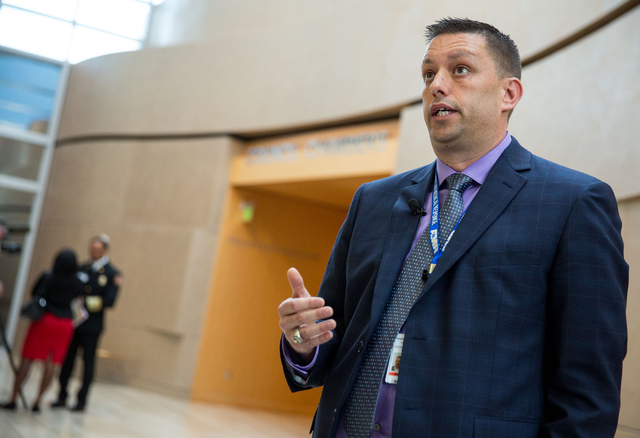Ambulance company manager says dispatch delays compromising patient safety

A recent change in the way Las Vegas handles emergency medical calls is causing delays of as long as 30 minutes for American Medical Response ambulances, the company’s general manager says.
AMR General Manager Scott White said the delays put patients at risk, though city fire department officials dispute that.
The private ambulance company stopped receiving automatic notifications of emergency medical calls on March 3. Now, Las Vegas Fire Chief Willie McDonald said, city paramedics are dispatched immediately to every call while AMR is called only as needed, so there may be a delay before the ambulance company is contacted.
White said Monday that in the month before the changeover, there were 29 calls to AMR where the delay was 5 minutes or longer. Since March 3, he said, there have been 199 delayed calls, and 13 were between 20 and 30 minutes.
“The patient doesn’t know there’s a delay and even the firefighters don’t know there’s a delay,” White said. “I don’t know if the delay is intentional or not.”
McDonald responded that it wouldn’t be intentional. “We don’t think like that.”
The fire chief ended the city’s longtime practice of dual response, where both the ambulance company and the Fire Department would get the notice of an emergency call simultaneously and both would respond.
McDonald changed the policy so the Fire Department would increase the number of times it transports patients to the hospital. His plan was that firefighters and AMR would evenly split the work.
One report said the change could bring additional revenues to the Fire Department of between $12 million and $14 million, although the report didn’t say how much of an additional cost or additional personnel might be required.
Both the Fire Department and the ambulance company bill for the transports and while both insist it’s a question of patient safety, it’s also a financial benefit for both sides to handle as many hospital transports as possible.
Before the policy change, the Fire Department was handling 30 percent of the hospital transports and AMR was handling 70 percent. Under the new plan, the Fire Department hasn’t yet hit the 50 percent hospital transport goal, he said. In September, McDonald wants to increase fire department transports to 60 percent.
McDonald’s approach that “‘we’ll call you when we need you’ puts people at risk,” White said.
AMR pays the city nearly $400,000 a year as a franchise fee to provide ambulance transport. Some insurance pays as high as about $1,000 for a hospital transport.
White noted that when a man was fatally stabbed about 8:30 a.m. April 17 at a McDonald’s restaurant at Sahara Avenue and Rancho Drive, an AMR ambulance was close by “at one of our primary positioning locations.” The crew with that ambulance was not in a position to see what was occurring at the McDonald’s and would have had to be notified, said White.
“We were not sent on that call,” White said. “Everyone should have responded.” The man was transported to University Medical Center where he was declared dead. He had stab wounds to the throat.
The fire chief said the Fire Department was called at 8:27 a.m., dispatched at 8:30 a.m. and the crew left the restaurant at 8:36 a.m. and was at the hospital at 8:40 a.m.
White called it “a broken system” and said the delays are a potential public safety issue. “Look at it from a patient’s perspective, if the patient has chest pains, shortness of breath or heart attacks.”
City Councilman Stavros Anthony, a former police officer, said he’s met with White and taken a tour of the AMR facilities and listened to White’s concerns. “Chief McDonald has a new way of doing business and I’m waiting to let him do his job.” He expects McDonald will present a report in about a month and the councilman said when he sees something on paper, he’ll look at it carefully. “This is something we have to pay attention to,” he said.
Meanwhile, ambulance operations in Clark County and North Las Vegas have not changed and are going smoothly, White said.
On March 25, AMR’s attorney Mark Ferrario asked the city for information about each emergency medical service call by the city, including the priority, the time of initial dispatch and time of arrival, and the time the firefighters returned to service for the time period March 3 to the date of the letter.
Ferrario also asked for records that reflect instructions or directions to the City Fire Alarm Office dispatchers from March 3 into the future.
White said they’ve been told it could take up to six months to provide the records.
Even before the change was made, AMR said calling firefighters exclusively could create situations where patients faced delays in receiving care and transports. The information from the city could prove or disprove White’s claim that the Fire Department starts picking up ambulance transports about 7:30 a.m. and when it hits a quote of 7o transports, somewhere between 4 p.m. and 7 p.m., the calls are shifted to AMR, another claim McDonald denied.
White hasn’t yet laid off any of AMR’s 440 employees, but is scheduling more shifts later in the day and at night.
“Litigation is not ruled out, but it’s not our preferred solution,” he said.
Contact Jane Ann Morrison at jmorrison@reviewjournal.com or 702-383-0275.